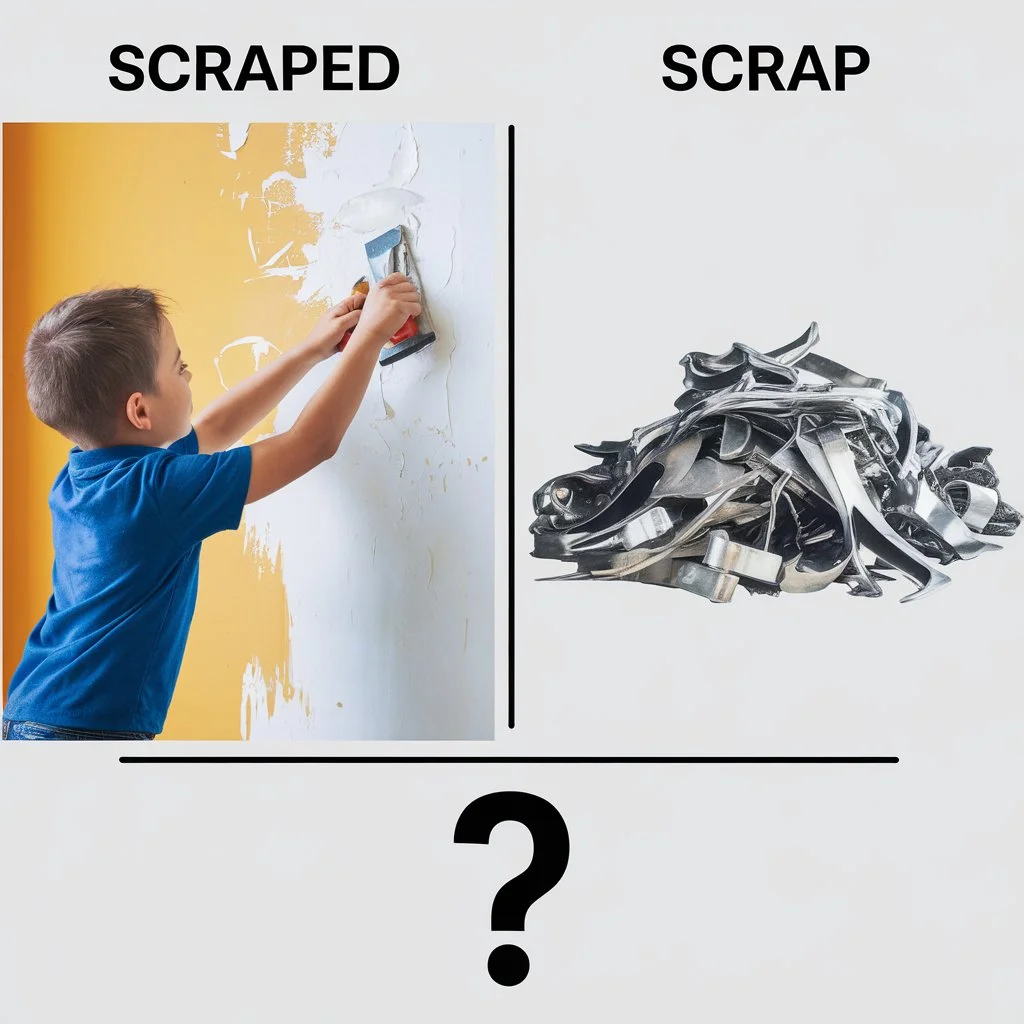Knowing how to spell “scrape” and “scrap” can be a bit tricky when you’re first learning English. If you don’t know much about the meanings of these words, it can be difficult to tell them apart. They may sound similar, but their meanings are completely different. So, let’s take a closer look at both words and clear up any confusion.
Is The Correct Spelling “Scrapped” Or “Scraped”?
The correct spelling can be either “scrapped” or “scraped”, depending on the context. Both are valid words in English, but they mean completely different things. If you accidentally use one when you meant the other, it could lead to confusion. It’s important to understand the difference between the two words early on, especially since their meanings are so distinct.
What Is The Definition And Meaning Of “Scrapping”?
“Scrapping” is a verb that means to throw something away or get rid of it. You can “scrap” a physical object or something less tangible, like a plan or an idea. When something is being removed, deleted, or discarded, the word “scrapping” is often used.
For example:
- I decided to scrap the old report and start fresh.
- Scrapping the project was the only logical option.
- We had to scrap the old software because it was outdated.
- Scrapping the presentation saved us a lot of time.
- I’m going to scrap this draft and write a new one.
- They scrapped the idea after finding out it wasn’t feasible.
- We should scrap this old design and create a modern one.
- Scrapping the event due to weather was a tough call.
- He scrapped his plans to travel when his flight got canceled.
- Scrapping the meeting will allow us to focus on the report.
- The company scrapped the policy after receiving negative feedback.
- She decided to scrap her proposal after the feedback.
- We had to scrap the old marketing strategy.
- Scrapping the blueprint was necessary after the design change.
- They scrapped their plans to move after reconsidering.
- I’ll have to scrap this idea and think of a new one.
- Scrapping the old equipment was a good decision for efficiency.
- They scrapped the contract due to unforeseen issues.
- We should scrap this section of the report.
- Scrapping the old routine helped me focus better.
- The team decided to scrap their approach after the meeting.
- I’ll scrap this outline and start over.
- They scrapped the website design after user testing.
- We should scrap the outdated features of the app.
- She scrapped her essay and wrote a new one from scratch.
- Scrapping the old menu brought new life to the restaurant.
- They decided to scrap the meeting to save time.
- Scrapping the old process helped streamline the workflow.
- I’m going to scrap this entire project and start over.
- Scrapping the outdated rules was a necessary step for progress.
When you remove the “-ing” from the end of “scrapping,” you get “scrap,” which has its own set of meanings, primarily as a noun. However, we’re focusing on the verb form today, so let’s stay with that for now.
What Is The Definition And Meaning Of “Scraping”?
On the other hand, “scraping” means dragging something sharp or hard across a surface. It’s often used to describe actions like removing dirt, grime, or grease by scraping. Additionally, it can refer to the unpleasant experience of rubbing against a rough surface, leading to a scrape on your skin.
For example:
- I hate scraping the ice off my windshield in the winter.
- He was tired of scraping the mud off his boots after every walk.
- She kept scraping the burnt food from the bottom of the pan.
- I’m not used to scraping snow off the driveway every morning.
- They spent hours scraping the old paint from the walls.
- I hate scraping my knee on the rough pavement.
- He carefully scraped the dirt from under his fingernails.
- I had to scrape the frost off the car windows before leaving.
- She spent the day scraping the rust off the metal surface.
- He scraped his leg against the sharp edge of the table.
- I need to get used to scraping the grease off the grill after cooking.
- She hates scraping the moss off the garden tiles.
- He was scraping the mud from the tires after driving off-road.
- I can’t stand scraping the labels off bottles before recycling them.
- She scraped her hand against the rough brick wall while walking.
- I spent hours scraping the glue off the hardwood floor.
- He hates scraping the barnacles from the boat’s hull.
- She carefully scraped the stickers off the glass.
- He kept scraping his fingers against the sharp rocks while climbing.
- I need to start scraping the snow off the roof before it gets too heavy.
- She was busy scraping the leftover wax from the candle holder.
- He scraped his elbow against the rough concrete.
- I’m tired of scraping the food remnants off the plates.
- She hates scraping the old wallpaper off the walls.
- He scraped his arm against the fence while trying to climb over.
- I spent the afternoon scraping the rust off my bike chain.
- She scraped the dirt off her shoes before entering the house.
- He carefully scraped the barnacles from the dock.
- I always end up scraping my knuckles when cleaning the oven.
- She was scraping the mud off the bottom of her shoes after hiking.
Like “scrapping,” there’s also a noun form for “scraping.” In this case, it refers to the action of something being scraped against a surface (like “the scraping of a spoon”) or to a small quantity of something (like “a scraping of food”).
For example:
- This is only a scraping of potatoes.
Does The Rule Also Apply To “Scraping” Vs “Scrapping”?
We’ve covered the differences between “scraped” and “scrapped.” Now let’s see if the same rule applies to their “-ing” forms, “scraping” and “scrapping.” The answer is yes, they follow the same rules as their past tense counterparts. The key is in the root word that each is built from.
The word “scraping” comes from “scrape,” meaning that something is being scraped. Similarly, the word “scrapping” comes from “scrap,” meaning that something is being discarded or thrown away. Once you understand the meanings of the base words, telling them apart becomes much easier.
Quiz: Have You Mastered The Difference Between “Scrapped” And “Scraped”?
Now that we’ve explained the differences between the two words, let’s test your understanding. “Scraped” is used in situations involving physical scraping or rubbing, while “scrapped” refers to discarding or abandoning something.
We’ve prepared five questions to see how well you’ve grasped the differences. Choose either A or B for each sentence to select the correct word.
- He (A. scrapped / B. scraped) his arm on the wall.
- We (A. scrapped / B. scraped) that idea because it didn’t make sense.
- I (A. scrapped / B. scraped) my knee.
- I (A. scrapped / B. scraped) that piece of paper when it no longer had use.
- They (A. scrapped / B. scraped) the whole group meeting.
Quiz Answers
- B (scraped)
- A (scrapped)
- B (scraped)
- A (scrapped)
- A (scrapped)
FAQs
What does scrap mean in English?
Scrap means to throw something away or stop using it. For example, if a plan isn’t working, you can scrap it. It’s often used when something is no longer useful or needed.
What does scrape mean in English?
Scrape means to rub something hard against a surface, usually to remove dirt or material. For example, you can scrape your knee on the ground or scrape food off a plate. It’s a physical action, often involving a rough surface.
Can you scrap a meeting?
Yes, when you scrap a meeting, it means you are canceling or stopping it from happening. You might scrap a meeting if it’s no longer necessary or useful.
What is scraping in cooking?
In cooking, scraping usually means removing bits of food or burnt parts from a pan or dish. It’s often done to clean the surface or prepare it for something new.
Is there a difference between scraped and scrapped?
Yes, there is a big difference. Scraped means you rubbed something hard or injured yourself on a rough surface. Scrapped means you threw something away or got rid of it because it was no longer useful.
When do you use scrapping in a sentence?
You use scrapping when you are talking about getting rid of something or stopping a plan or action. For example, you might say, “We’re scrapping that project because it’s no longer needed.”
What happens if you scrape your skin?
When you scrape your skin, it means you rubbed it against a rough surface, and it may cause a small injury or scratch. This can happen when you fall or brush up against something sharp.
Can you scrap an idea?
Yes, when you scrap an idea, it means you decide not to go through with it. If an idea doesn’t seem to work, you can scrap it and come up with a better one.
Final words
In conclusion, understanding the difference between scrap and scrape is important for clear communication. While scrap refers to discarding or canceling something, scrape involves rubbing or removing something from a surface. Learning how to use these words correctly will help you avoid misunderstandings and express yourself more clearly. With a little practice, you’ll easily master the difference between scrapping and scraping.

I’m Clara Whitmore, the girl running the show at “Grammer Grove.” I’ve been playing with expressions and formats to make grammer a whole lot of fun. Over at Grammer grove, we’re here to make your English grammer incredible. Let’s add some professionalism and gratitude to yourwritting together!












